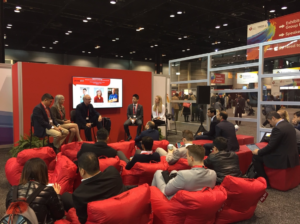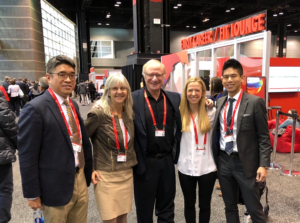As the AHA’s largest meeting of the year kicked off today in Chicago, the AHA Early Career / FIT Lounge, with its prime position at the main entrance to the exhibition hall, was the venue for the first ever Sports Cardiology session dedicated to early career trainees at Scientific Sessions. With the bustling crowd of Sessions attendees lining up alongside the FIT Lounge as they awaited registration check-in, many peered in to the first Early Career / FIT session of this year’s conference, in which an expert panel of Sports Cardiologists shared their insights on this emerging field within cardiology.
This session’s faculty panel consisted of:
- Ben Levine – Professor of Cardiology and Exercise Sciences at UT Southwestern in Dallas, Texas
- Rachel Lampert – Professor of Cardiology and Electrophysiologist at Yale University in New Haven, Connecticut
- Eugene Chung – Associate Professor of Cardiovascular Medicine and Director of the Michigan Medicine Sports Cardiology Clinic in Ann Arbor, Michigan

Sports Cardiology Early Career / FIT Session at #AHA18 Scientific Sessions
Along with Dr. Beth Hill (@BethHillDO, Cardiology Fellow at Scripps Clinic), I was fortunate to moderate the discussion from this distinguished group. They shared their stories about their varied paths towards Sports Cardiology, which included influential encounters with athletic patients, personal experience as a high-performing athlete, and sheer passion for sports and exercise physiology.
As Sports Cardiology is a relatively nascent sub-specialty, there currently is no distinct path for interested trainees to follow. At this time, only one formal training program in Sports Cardiology exists – the well-established Cardiovascular Performance Program at Massachusetts General Hospital, directed by Dr. Aaron Baggish. However, with the recent publication of a Sports Cardiology Core Curriculum by the ACC Sports and Exercise Cardiology Council (Baggish et al., JACC 2017) and rising interest in the field among trainees (Afari, JACC 2017), the field appears primed for growth.
The panel offered many salient pieces of advice for trainees interested in pursuing a career in Sports Cardiology, which I have done my best to distill into the following points:
- Choose What You Love: Fellows seeking to become Sports Cardiologists often ask which sub-specialty they should choose (i.e., EP, Imaging, Heart Failure) to best position themselves to enter this field. The panelists agreed that the answer is to choose the area that best suits one’s own interests. More importantly, they advised to not forget that Sports Cardiologists are, by definition, Cardiologists, and to not lose sight of the importance of a thorough grasp of General Cardiology when practicing as a Sports Cardiologist.
- Seek Specialized Training in Exercise Physiology: “What distinguishes a Sports Cardiologist from a General Cardiologist?” Dr. Levine made the argument that Sports Cardiologists offer the extra expertise in exercise physiology and understand the physical demands imposed on the cardiovascular system by elite athletes. Assessment of athlete physiology must go “beyond the Bruce protocol.” Indeed, the 2015 AHA/ACC Guidelines specifically state that “the exercise testing protocol [of athletes] should be based on maximal performance rather than achieving 80% to 100% of the target heart rate to come as close as possible to the level of exertion achieved during competitive sport” (Zipes et al, Circulation 2015). Every effort should thus be made to recapitulate this degree and mode of exertion. Further, the elite athlete’s response to various maneuvers, such as tilt table testing, may be different, and a deep understanding of these nuances are incredibly important in this unique population.
- Educate and Network: While there has been increasing awareness of the specialized cardiovascular care needs of the athletic population, it remains important for budding Sports Cardiologists to educate those providers in their network who tend to be the first contacts with athletes. This group includes primary care and sports medicine physicians, sports trainers, and student health centers, as these providers are often the first ones to hear about potentially concerning cardiac symptoms in athletes. Along these lines, athletes themselves can benefit from education on their own cardiovascular health, as they are not immune from disease regardless of their level of fitness. Trainees are encouraged to consider giving educational talks to athletes in the community (e.g., cycling and running clubs) and volunteer at athletic events to help disseminate these important issues.
While the session was filled with many more helpful tips for interested trainees, the panel’s ultimate recommendation was to make every effort to attend the ACC’s Care of the Athletic Heart meeting next year, which will take place in June 2019 in Washington, D.C. As a participant in last year’s Athletic Heart meeting, I strongly agree.
Overall, the panelists engaged the audience in an excellent discussion, and this topic served as an excellent segue for the eagerly awaited release of the AHA’s physical activity guidelines, which will be announced this Monday, November 12th at Scientific Sessions.

(Left to Right) Faculty Panelists: Eugene Chung, Rachel Lampert, and Ben Levine;
Session Moderators: Beth Hill, Jeff Hsu
For more information on the rest of my experience at #AHA18, please follow my Twitter feed (@JeffHsuMD) as well as the hashtag #AHAEarlyCareerBlogger.